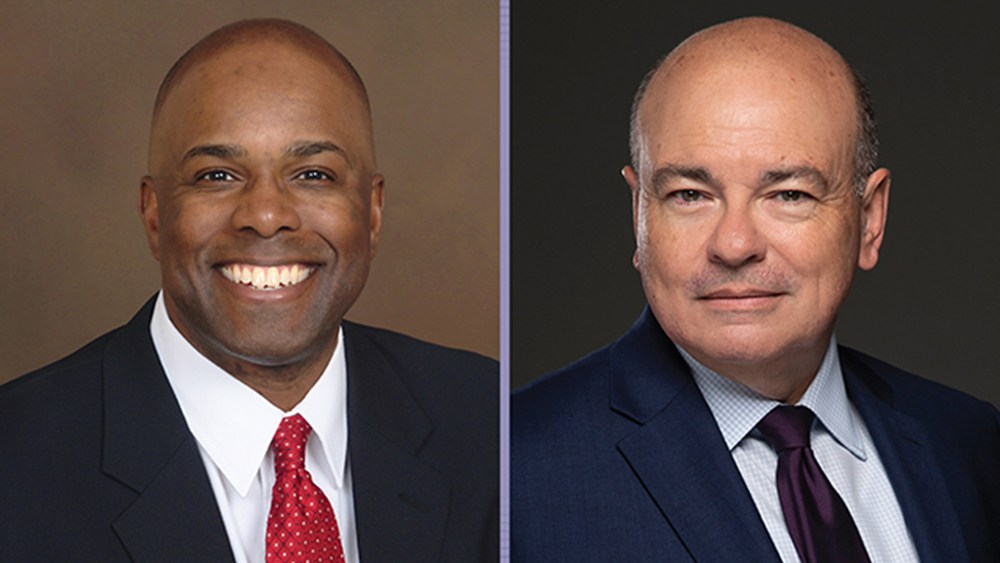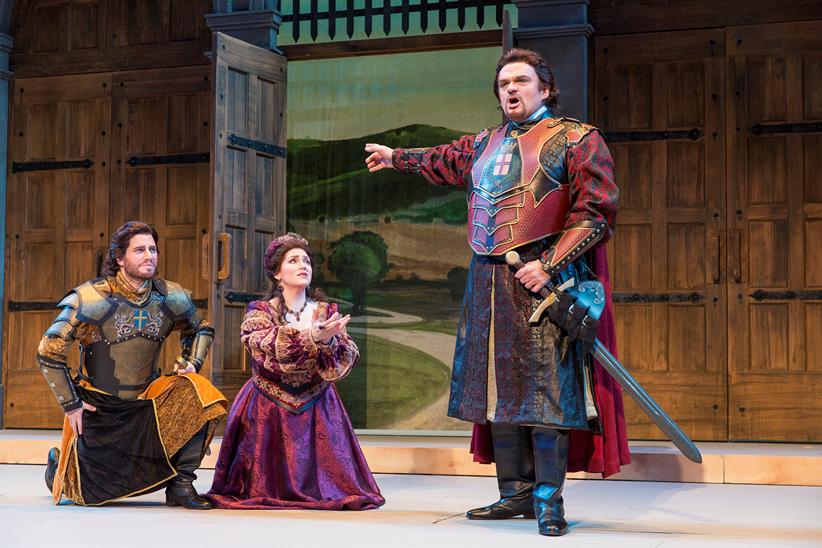Advocating for Opera
Sarasota Opera was one of the first American opera companies to return to the stage for indoor performances. Like so many others, the company owes much of its rebound to the federal relief that Congress made available over the past year and a half.
Tony Shivers, director of government affairs at OPERA America, called Sarasota Opera’s general director, Richard Russell, to talk about the impact of that funding on what the company has been able to do — and how it shapes their outlook on the future.

TONY SHIVERS: Opera Sarasota is lucky to have you, Richard. You’ve been fighting hard for the company since day one of the pandemic. Let’s look back to March 2020: How was Sarasota Opera first affected?
RICHARD RUSSELL: I will never forget the date: Friday the 13th. We normally have a two-month winter festival season in February and March, and we were 11 performances away from the end. We had seen decreasing ticket sales and smaller audiences in the weeks preceding. Early that morning I was on a conference call with the city manager of Sarasota and the other arts leaders. He informed us that any venue that was larger than 500 seats was going to need to close. We had to shut down.
We informed our company, most of whom came in from out of town and were living in either our apartments or local housing. We told them we were not going to be able to continue to perform, but we made the commitment that we would pay them their entire contracts. We had been hemorrhaging money for a couple weeks as ticket sales began to decrease; we probably lost in the neighborhood of $1.5 million. But we were not going to withhold the rest of their money.
Financially it was a very difficult time, and there was so much uncertainty. We didn’t know what kind of help we would get. We didn’t know if our donors would stay with us. We asked donors if they would donate their unused tickets rather than ask for a refund. But it was a really unsettling time. Those two months were probably the worst of my professional life.
TONY: It’s good of you to carry through on paying your artists. Were they able to take advantage of the federally enhanced unemployment benefits available to them in the CARES Act? Congress was quick to pass relief in March 2020, and it was the first time that gig workers qualified for unemployment.
RICHARD: Most of our artists come from out of town, even our orchestra in our winter festival. We encouraged all our freelance artists to avail themselves of federal relief funding that was available to them in Florida and elsewhere.
We did our best, what little we could, to employ people. A number of artists stayed on for a couple of weeks. We did some virtual programming. We had some singers do performances outside. When gathering outdoors was discouraged, we encouraged our singers to film themselves back in their homes, in their driveways, or on their balconies. It actually received some news coverage in Rochester and Pittsburgh.
TONY: The CARES Act was the first pandemic relief legislation for businesses and nonprofit organizations, and there have been a series of other packages since, including the American Rescue Plan from earlier this year. How were you able to leverage that support for Sarasota Opera?
RICHARD: I kept a very close eye on what was going on in Congress and read more legislation than I’d ever thought I would. I have a new awareness of what goes into putting together a bill. It was great to have OPERA America as a resource in navigating those waters. I don’t think we would have gotten a Shuttered Venue Operators Grant this year without your guidance, Tony!
I’m grateful to say that our donors were very supportive and stayed with us. And our ticket buyers were responsive. But it was the legislation — the relief funds — that came in spurts over the last 18 months that were so vital. The first, the Paycheck Protection Program, provided liquidity so that we could pay our full-time staff and save some other money to pay off the rest of the artists’ contracts.
We were also very lucky that we were able to lobby locally for CARES Act funding that flowed down to the state and county levels. It was a concerted effort among our local arts organizations and small businesses: Sarasota is a huge arts community, and the performing arts are the second largest employer in the area. We made the case that we’re a huge economic driver and employ a lot of people, and ultimately our county legislature set aside $5 million to support the arts. We were able to get about $250,000, and it was very important to keep us afloat.
Our first priority was to get people working... Then our focus turned to how we could serve our community.
TONY: Did getting those public funds affect your outlook on how you moved forward as a company? It was taxpayer dollars, after all. How did it guide your priorities?
RICHARD: Our first priority was to get people working. We had furloughed some people at the beginning of the pandemic and did a salary cut for others. We were able to bring everybody back and, in time, restore salaries with the back pay.
Then our focus turned to how we could serve our community. We had a unique situation in Florida, in that we were one of the most open states over the last year. We shut down in April for maybe six weeks, then there was a phased reopening, and by September we were completely open again. But it was not high on people’s list at that time to come together in a theater. Still, we had a little bit more flexibility than our colleagues in other places.
Many organizations went to streaming live. We didn’t have a big archive of things that we could give to our audiences, so we did some talks with artists. As we got into the fall, we decided to do some live performances: two outdoor concerts and one inside in November 2020. Because we own our opera house, we could do a socially distanced concert without breaking the bank. We could employ our artists and serve our audience.

TONY: Were you doing fully staged performances?
RICHARD: We reconfigured our 2021 winter season of four operas to two smaller seasons with shorter works that were under an hour and a half long with only a few performers. Our audiences really appreciated our ingenuity in pulling this together. I think we recognized that the shorter performances were attractive to a part of our audience — and that’s going to become part of our programming going forward.
I must say, there was a real sense of community — that we were all in this together. That’s been a big talking point of ours for the company, and it will be going forward: We’re not just a place people come to for nice performances; we’re part of this community. The people in our audience make up the community, as do our community of people who work here.
TONY: You’ve been really determined in advocating for support and for ensuring the arts and cultural sector continues to thrive, in Florida and across the country. How has your experience over the past year and a half changed your outlook on advocacy?
RICHARD: Advocacy is really important. I think our county got $83 million in CARES Act funding, and when they first started to talk about how they were going to allocate it, they forgot the arts. It was the consortium of our arts organizations that got together and started talking about all the people who work in our sector. We had that same conversation around the Save Our Stages program, too. We made the case to our local federal officials that we are an important economic driver in this community.
As an arts community here in Sarasota, we have recognized that we need to do a better job of making the case to our legislature and our community about our value. If our community doesn’t recognize it, they’re not going to participate, and they’re not going to encourage our elected officials to help us.
The onus is on us to make the case within our community of the value we bring. We’re not just an elitist institution for rich people to see opera. We permeate our communities. We do education programs. We employ people. We bring business to restaurants and hotels. It’s incumbent upon us to make that case.
That’s something I’ve taken from this. We need to do more as an industry — on the local, state, and federal levels — to make people aware that we’re not elite institutions. We are integral parts of our communities.
This article was published in the Fall/Winter 2021 issue of Across the Board, a publication of OPERA America for opera company trustees.





